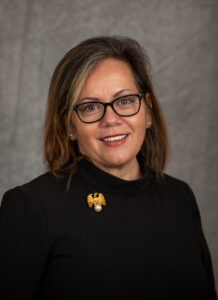By Victoria Arthur
Statehouse Correspondent for Indiana’s Catholic Newspapers
The Indiana Catholic Conference and others, including the state attorney general’s office, are backing a bipartisan bill that would make it a felony in Indiana to coerce a woman into having an abortion.
House Bill 1217, which passed the Indiana House of Representatives 73-18 on Jan. 25 and is now under consideration in the Senate, requires medical personnel to ask a pregnant woman seeking an abortion whether she has been forced by someone to do so. If she indicates that she has, the medical provider would be required to offer her information on services available, the use of a telephone and an alternative exit from the health care facility.
In addition, the bill also mandates reporting of a coerced abortion to law enforcement. If ultimately passed by the Senate, the legislation would make Indiana the 19th state to offer protections to women from coerced abortion.

“I believe in the sanctity of life,” said Rep. Joanna King (R-Middlebury), the primary author of the legislation. “I want to make sure that, when there is a woman who is pregnant and has no desire to abort her child, and someone is forcing her to do something against her will, there are criminal penalties for that person.”
During a Jan. 18 House committee hearing on the bill, an official representing the office of Indiana Attorney General Todd Rokita expressed full support for the legislation.
“Coercion is terrible in all contexts, but it is especially horrific in the context of abortion because it means life or death,” said Corinne Youngs, policy director and legislative counsel for the attorney general’s office. “Examples abound of where women are coerced into abortion.”
Youngs also linked this issue to the culture of violence facing many vulnerable women in difficult circumstances. She cited data revealing that 22 percent of women have experienced “intimate partner violence” and that evidence suggests the problem has escalated during the COVID-19 pandemic.
“This bill has the potential to unearth horrific (examples of) human trafficking, domestic abuse and child abuse,” Youngs continued. “The state has an interest in this law for protecting women from social, emotional, physical and psychological harm. Failure to protect these women is wrong.”
The ICC, representing Indiana’s five Catholic bishops, also rose in support of the bill during the committee hearing, calling coerced abortion a “morally reprehensible act.”
“The provisions of this bill provide resources for vulnerable women and hold offenders accountable,” said Alexander Mingus, associate director of the ICC, the public policy voice of the Catholic Church in Indiana. “This reflects the Church’s priorities, and we lend our full support.”
Protecting human life from conception to natural death is at the forefront of the Church’s priorities – and, therefore, the ICC’s. Pro-life issues are particularly in the spotlight as the country awaits a U.S. Supreme Court ruling that could potentially overturn the 1973 Roe v. Wade decision legalizing abortion.
The current case before the high court, Dobbs v. Jackson Women’s Health Organization, involves a Mississippi law banning most abortions after 15 weeks. The ruling, anticipated this summer, was on the top of the minds of the 1,000 Hoosiers who recently converged on downtown Indianapolis at the annual Indiana March for Life. This year’s march coincided with the 49th anniversary of the Roe v. Wade decision that has led to the deaths of more than 62 million unborn babies.
Throughout its 55-year history, the ICC has supported pro-life initiatives brought before the Indiana General Assembly. According to ICC Executive Director Angela Espada, this includes standing up for the unborn while opposing the death penalty and assisted suicide.
“We must be passionate about respecting all human life,” Espada said. “That means being passionate about correcting lax gun laws and ending capital punishment. And if the Supreme Court’s ruling allows states to restrict or even ban abortion, those who are passionate about saving the unborn should join other pro-life Hoosiers, who have supported mothers and their children, to expand their efforts and provide necessary services.”
Rep. King, who is a relative newcomer to the Indiana House of Representatives, says her primary focus at the Statehouse will be women’s and children’s issues. House Bill 1217 is her first piece of legislation, and she is undaunted in championing it despite opposition from Planned Parenthood and other critics.
The lifelong Elkhart County resident, who is a small business owner, a longtime school board member and Boys & Girls Club trustee, also says that faith plays a key role in her decision making.
“I am a Christian, and faith has always been a very important part of my life,” said King, the daughter of Amish parents and herself the mother of four and grandmother of two. “Valuing life has always been something that’s a part of our DNA.
“I want to do everything I can to get this bill across the finish line.”
To follow this and other priority legislation of the ICC, visit www.indianacc.org. This website includes access to I-CAN, the Indiana Catholic Action Network, which offers the Church’s position on key issues. Those who sign up for I-CAN receive alerts on legislation moving forward and ways to contact their elected representatives.
